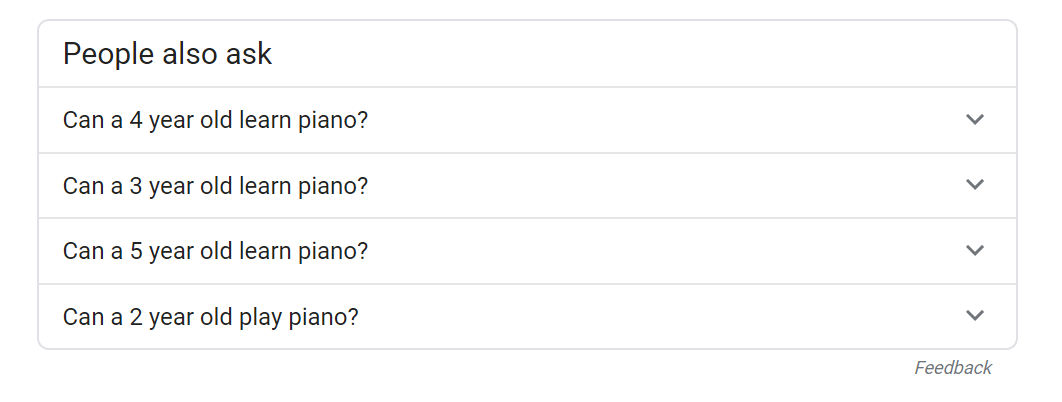At What Age Should You Start Piano Lessons?
It’s a question that parents and adult students everywhere are asking - when should you start piano lessons? The short answer for adults or teens is easy: as early as possible. It’s a little bit more complicated for children, and it boils down to a few qualifications:
Has your child developed fine motor skills?
Can they sit still and listen for 30 minutes at a time?
Are you, the parent, committed to practicing (or supervising practice) with them at least five times per week?
If you are wondering if your child is too young to start lessons, you might be interested to know that you aren’t alone:
That’s a list of frequently asked questions that Google is showing in the organic search engine results pages.
In this blog, we’ll talk about different age groups, what you should expect from your child’s lessons, and how to determine your child’s readiness for lessons.
What is The Best Age To Learn The Piano?
Many experts agree that ages 6-9 is a good window for starting your child at the keyboard. They’ve probably experienced classroom learning by that time, and they will be large enough and strong enough to sit at the piano and play. They will also know their letters by that point, and they should also be able to count (you really only have to be able to count to four for beginner piano lessons!). They will also be able to communicate with the piano teacher and comprehend instructions.
Is It Ever Too Late to Learn the Piano?
Can you learn the piano as an adult, and is it ever too late to get started? Individuals at all stages of adulthood successfully learn how to play the piano, and we have young adults, middle-aged students, and retirees taking lessons at the Philadelphia Piano Institute. If you are starting from scratch, you should expect about two years of practice before you are able to play satisfying music and “sight read,” but if you are particularly motivated, you can cut that to about a year or so.
The real question to ask is whether or not you have time to practice every day. Piano is a lot like learning a language, and you have to devote consistent effort if you want to really learn. Practicing three hours the night before your lessons won’t do much, but if you practice 30 minutes every day, you will see significant, regular improvement.
So no, it is almost never too late to learn the piano. And the sooner you get started with lessons, the sooner you’ll be able to play!
Can a 2 Year Old Learn Piano?
No. You should encourage musical discovery with your child by getting musical toys, letting them fool around on your piano if they express interest, and maybe enrolling them in music classes for toddlers and similar activities.
Can a 3 Year Old Learn Piano?
We’ve had one instance of successful lessons with a three year old at the Philadelphia Piano Institute, and his parents were musicians, he watched his older sibling all take piano lessons, and he exhibited remarkable intelligence. Outside of a child prodigy scenario, this is really the only situation where it would be worth your time to enroll your three year old in lessons.
Can a 4 Year Old Learn Piano?
There’s a 50/50 chance that your four year old will be ready for piano lessons. Most teachers or academies will require a trial or “interview” lesson, and you will be able to work with the instructor to determine your child’s readiness for piano. This is a sensitive age -- you might do more to ensure their long-term enjoyment of the piano if you continue to spark their curiosity at the instrument rather than formalizing the piano with weekly lessons. Once the piano becomes a “chore,” it sometimes loses its appeal.
Can a 5 Year Old Learn Piano?
Five is the minimum age requirement at the Philadelphia Piano Institute (with rare exceptions), and many children are able to have successful lessons at this age. Starting your child at age five is still very young, so if they are motivated and if you help them practice, they will reach proficiency ahead of their peers. Also, five year olds almost always catch up to children who started at age four in a short period of time. Which brings us to our next point:
Can Your Child “Catch Up” With His or Her Peers?
Don’t worry if your child started piano lessons later than his or her peers - kids and teenagers have a remarkable ability to learn instruments quickly. Let’s say child A starts piano at age 5, and child B starts piano at age 8. There’s a very good chance that they will be playing the same level of literature and have the same capabilities by the time they are in middle school.
This is because:
Students who start a bit later are often motivated to “catch up”
Older students are more mature and intellectually developed, so they will learn advanced concepts more easily
Older students usually have more discipline and stamina when it comes to practicing
Older students don’t fall into the trap of viewing piano as “routine” early on in their development
Get Started With Piano Lessons
If you are interested in signing up for lessons, enrolling your child, or getting live piano lessons online, please reach out at your earliest convenience. Our studio is located in the Queen Village neighborhood at 621 S 2nd Street, Philadelphia, PA, 19147, and we would love to hear from you and help you learn the piano. We also offer a number of other music lessons in Philadelphia, including:
guitar and more
